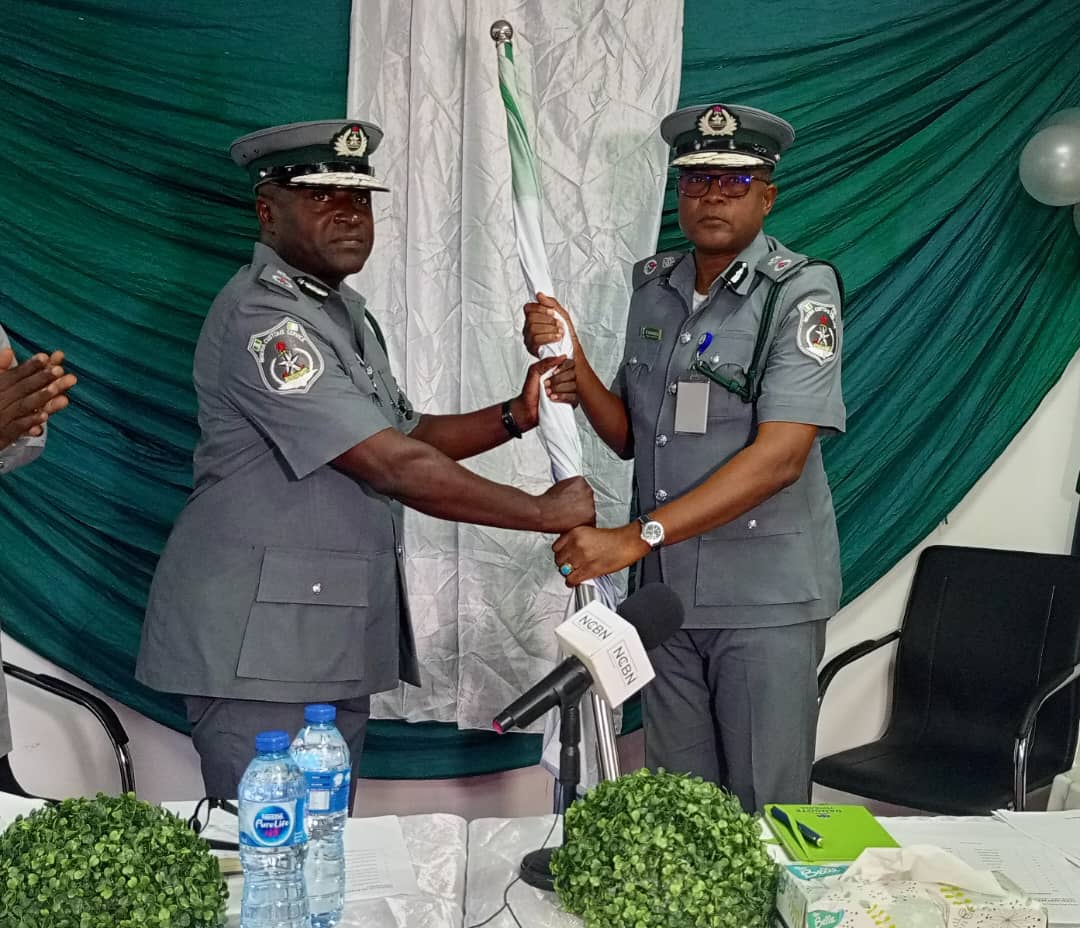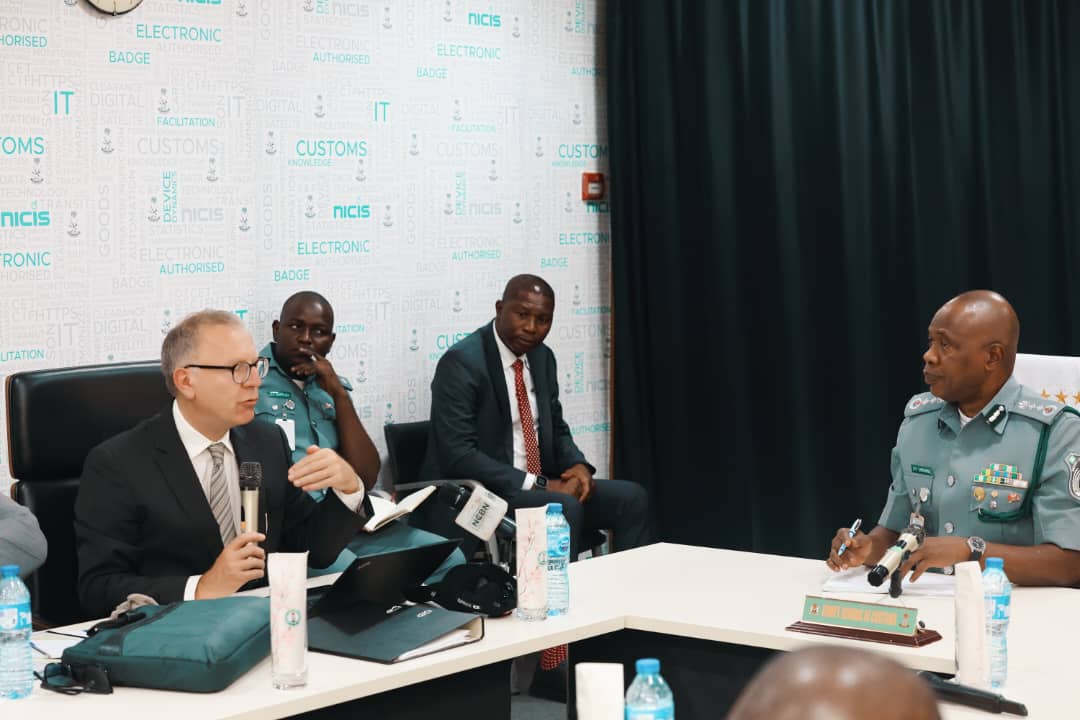Customs Corner
Nigeria’s Porous Border Makes Case for Customs Modernization Project

Author: Gift Wada.
With a total land border of 4,045 Km, and 853 Km of the maritime domain, statistics show that there are about 1,500 identified land border crossings into Nigeria, but only 84 (covering 4,000 sq km) have approved control posts.
The porosity of Nigeria’s land border has resulted in the prevalence of drug and human trafficking as well as smuggling.


In 2022, Nigeria’s Chief of Defense Staff, Maj. Gen. LE Iraboh said the vulnerability of the vast unmanned land areas has continued to be a key source of criminality and violent crimes in parts of the country.
Considering the global nature of border fragility which is not peculiar to Nigeria, the World Customs Organization (WCO), in collaboration with the Nigeria Customs Service organized in Abuja Nigeria, a Global Conference entitled “Enabling Customs in Fragile and Conflict-Affected Situations”.
Fragile borders are areas where state agencies, particularly Customs, are unable to operate properly owing to the insecurity created by non-state armed groups. Insecurity and disruption of the State’s administration affect the border economy and the livelihood of border communities.
The event, which took place from 31 January to 2 February 2023, brought together more than 100 representatives of Customs administrations from over 40 countries to discuss the role of their administrations in fragile and conflict-affected situations (FCS) and how the WCO can support its Members in shaping their strategies in response to these complex environments. They were joined by representatives from various United Nations agencies and the donor community.
The Conference highlighted the similarities that exist across several regions concerning fragile borders: the role of borders as symbolic and economic resources for communities, the embeddedness of smuggling in social activities, the connection between smuggling and mining activities, and the informal taxation levied by non-state armed groups, such as terrorists, criminal gangs or guerrillas, on traders and cross-border flows of commodities.
In his opening speech, WCO Secretary General Kunio Mikuriya reminded participants of the objective of this event, namely to transform the outcomes of the WCO field research initiated in 2016 in more than 14 countries into a practical action plan for all Members impacted by fragility and conflict. “We aim at refining our analysis and at fuelling an Action Plan on Fragile Borders that should guide the activities of the WCO over the coming years in this area”, he said.
Nigeria’s Vice President, Prof. Yemi Osinbajo pointed out that “fragile borders not only aggravate conflicts, they rob the states of crucial income that could address some of the social issues that contribute to conflict. It is obvious from the sheer number of fragile borders, and the convergence of fiscal and security issues at such borders, that governments must actively redefine the role of Customs to be properly integrated into the security architecture.”
Comptroller General of the Nigeria Customs Service, Col. Hameed Ibrahim Ali (Rtd) welcomed delegates and explained that “fragile situations call for an analysis of the role of Customs in national security policies, the capacity and tools available to Customs as well as strategies in enabling Customs and the coordination between agencies of government in effectively managing fragile and conflict situations at borders”.
The Conference has provided an opportunity to cross-fertilize the policy debates on fragile borders from Customs, anti-terrorism, humanitarian and economic perspectives, and to extend both geographically and conceptually the notion of fragile borders that has been explored so far by the WCO.

 Similarly, Nigeria Customs while presenting paperwork titled “Fragile Borders, Insecurity and Arms Smuggling; The Nexus” at the IALEIA training held in the United States of America, said Nigeria’s border faces a myriad of challenges owing to its Porosity.
Similarly, Nigeria Customs while presenting paperwork titled “Fragile Borders, Insecurity and Arms Smuggling; The Nexus” at the IALEIA training held in the United States of America, said Nigeria’s border faces a myriad of challenges owing to its Porosity.
Some of the challenges highlighted are Smuggling of Arms and Ammunition, Child and Human Trafficking, Transhumance, Illegal Immigration, Banditry and Terrorism, Drug Trafficking, Counterfeit Pharmaceutical Products, Money Laundering and Illicit Wildlife Trade.
These challenges were emphasized by Customs personnel who were present at the high-level professional training: Comptroller of Customs Babatunde Olomu, Chief Superintendent of Customs Tasiu Saulawa Sanusi, and Superintendent of Customs Misbau Murtala Sadiq.
The United Nations Office on Drugs and Crime (UNODC; 2020) Global Study on Firearms Trafficking noted that illicit Small Arms and Light Weapons (SALW) in Nigeria were about 70% of the 500 million estimated in the Sahel Region of West Africa (The Sun: Dec 7, 2022)
Experts equally agreed with the above assertion and estimated that over six million of these illicit SALWs are in circulation in the country and majorly in the hands of civilians.
The proliferation of SALWs aids non-state actors such as Boko Haram terrorists (BHT), Unknown Gunmen (UGM), Kidnappers, Farmers/Herders and Armed Bandits. These imminent threats spurred a systematic and regular review of strategies among security agencies saddled with the responsibility of safeguarding national boundaries.
The Nigeria Customs Service also partners with other security agencies in securing the borders such as the Joint Border Patrol Team (JBPT).
The JBPT Operation is a coalition under the umbrella of the Office of the National Security Adviser (ONSA). It’s made up of components from the military, paramilitary, and intelligence agencies inclusive of Customs, Immigration, the Police Force, State Security, and the National Intelligence Services, which all combined operate under the lead role of the Nigeria Customs Service (NCS).
*Challenges of Border Management*
Despite the synergy between security agencies and local and international collaboration, border management faces Minimal Trans-Border Control, Conflict in the Sahel Region, Inadequate or near Absence of IT infrastructure, Interagency Rivalry, Leak of Armouries, Political Desperation, and Increased Number of Local Arm Producers, and Smuggling.
“Smuggling still takes place through complete avoidance of controlled/official border posts, use of unapproved and sometimes approved routes, false declaration, use of animals, motorbikes, trucks, and concealment on the body, vehicle or any form,” the Customs Team noted.
*NCS Modernization Project*
As part of the effort to cushion the effects of the country’s porous border, the Nigeria Customs Service has embarked on Improved IT Infrastructure, Improved Business and Security Features, Memory Based Reasoning System, Improved Intelligence and Risk Management Tool and Improved Features for Monitoring, Tracking & Decision Making.
Projects undertaken by the Service to facilitate trade and fight smuggling are as follows:
*1. Nigeria Integrated Customs Informations System II (NICIS II)*
This is a platform where Traders or Agents submit all information required for clearance to the Customs Single Window service.
Responses from the various authorities and financial institutions are returned to the Trader or Agent. An all-positive final response denotes cargo clearance.
It is a single window customer service where one selects, sorts, filters information, routes it to targeted recipients (agencies, banks, etc.) in the proper sequence or flow and returns responses to Users.
It has a simplified Customs clearance procedure divided into two segments- Trader zone and Customs zone. It allows the physical exit of goods once payment is registered.
*2. Non-Intrusive Inspection Technology (NIIT)*
The Federal Government recently acquired 3 scanners with a dual-energy of 6/3 MEV to detect both organic and inorganic materials. The scanners also have radioactive detector software used to detect images from a container that carries radioactive materials. They were installed and put into use at Apapa, Tincan Island Port and Onne Area Commands of the Nigeria Customs Service.
*3. NCS Efforts on Border Patrol*
In addition to the procurement of 515 units of operational vehicles meant for border patrol, the service has over the years invested in its ICT infrastructure through the introduction of a Geospatial Unit to enable the use of remote sensing and Geography Information System (GIS) for a digital cartographic analysis of the border crossings across different geographical zones in Nigeria.
*4. NCS Effort On Maritime Domain*
To add to existing seagoing vessels, the CGC recently commissioned 18 additional patrol boats to stem the tide of smuggling in the waterways.
*5. NCS Efforts on Air Patrol*
In April 2023, the Federal Government of Nigeria approved the sum of N3.47BN ($7.4M) for the purchase of additional aircraft to add to the existing fleet in the service to enhance its air surveillance capability.
*6. Nigeria Customs Trade Modernization Project*
The Federal Government of Nigeria awarded a contract totalling the sum of N142.24BN ($307.698 Million) in April 2023 for the full implementation of the Customs Modernization Project. This project aims to eliminate human interference to ensure seamless trade facilitation.
The Trade Modernization Project has been projected to be a bedrock of Customs Modernization while adhering to relevant laws, guidelines and agreements as elucidated in the WTO TFA, WCO Conventions, standards and programmes, and the African Continental Free Trade Area (AfCTFA).
The project is a global concept and Customs Administrations in developed countries are taking full advantage of the electronic developments to simplify Customs processes and procedures. The project aims to provide an end-to-end ICT Platform to digitalize customs business processes and procedures, upgrade NCS ICT infrastructure to world-class and address critical operational challenges and loopholes, using new technologies like Big Data Analytics, Artificial Intelligence, etc. It is an integration of applications, platforms and hardware involving an all-in-one nationwide import & export management system.
Additionally, the solution also provides facilities for excise processes, security/anti-smuggling activities, manifest processing, licensing, revenue collection and information sharing amongst others.
ADVERTISEMENT

ADVERTISEMENT
Customs Corner
Lagos FTZ Customs Hits N54B Revenue, as Comptroller Babandede Hands over

By Lucy Nyambi
The Nigeria Customs Service, Lagos Free Trade Zone Command, hits N25,094,030,014.00 in revenue from the Free Zone.
The Command also generated N29,671,886,266 from Lekki Port, making it a cumulative total revenue of N54,765,916,280 for quarter of 2024.
The outgoing Customs Area Controller, Comptroller Mohammed Babandede, made this known in a ceremony on Wednesday, 17 April 2024, while handing over leadership to Comptroller Olanrewaju Olumoh.
Speaking about his experience at the Command in the last seven months since he assumed office, the Customs Area Controller (CAC) Babandede noted that the most important thing he is taking out of the command is the synergy between agencies and engagement with stakeholders.
He said, “When I came in September, the free zone was only able to generate revenue of about N2 to N3 billion, but to God be the glory, we can now generate N15 to N25 billion in a month”.
“We engaged a lot of stakeholders, and we worked with other government agencies because we can not do it alone, and we established a bond like a family,” Babandede stated.
He advised stakeholders to maintain a high level of integrity in their cargoes and urged the new Customs Area Controller to carry everyone along.
On his part, the new Customs Area Controller, Comptroller Olanrewaju Olumoh, appreciated his predecessor for his purpose-driven leadership, pledging to build on his very good foundation while also soliciting support from stakeholders and officers.
In his words, “I am happy that I am not meeting this Command at the scratch level. I have optimism to build on the very good foundation Comptroller Babandede is leaving behind. I thank you, Comptroller, for your purpose-driven leadership.”
“To our critical stakeholders, I acknowledge the wonderful support you have been giving the command over the years; I want to assure you that the over-riding goal will be how to make this Command more robust, more alive and more economically rewarding to the country. I promise to operate an open-door policy just like my predecessor. ” Olumoh added.
Stakeholders, as well as representatives of sister agencies, showered encomium on the outgoing CAC while also urging the new CAC to continue on the integrity and legacy already in existence at the Free Zone for the nation’s good.
Customs Corner
Comptroller Yusuf Hands over Leadership of MMAC to Comptroller Awe

By Abass Quadri
Comptroller Mohammed Yusuf, in charge of the Nigeria Customs Service, Murtala Mohammed Airport Command, has handed over the mantle of leadership to the new Customs Area Controller, Comptroller Michael Awe.
In a ceremony held at the command on April 17, 2024, the outgoing Comptroller Yusuf expressed gratitude to God and his subordinates for ensuring peace within the Command, adding that “when I came in, the revenue target was N225m daily, shortly after, the target was increased to ₦400m but we were able to make 90.2% of the revenue target”.
“This year, we are saddled with generating N550m daily. With our strategy, we have gotten N14bn in January, February, and N16bn in March, which means our target of N12bn has been surpassed within the past few months. ” He emphasised.
He added how he managed stakeholders through an open-door policy, which greatly facilitated positive engagement and revenue generation.
Comptroller Yusuf also urged the officers to rededicate themselves to duty and fully support the new CAC, Awe.
He also advised CAC Awe to give a listening ear and, likewise, to operate an open door policy to succeed in his new position.
Appreciating his predecessor for his hard work, CAC Awe noted that even though he is not entirely new at the Command, he will consolidate on the existing structure, which requires the cooperation and support of all and sundry.
“This environment is a known place to me because I was the team manager of the Customs Intelligence Unit here some couple of years ago.” He said
“Seeing the revenue achieved, things are really going well, and that is due to everyone’s hard work, which I would request us to continue to contribute,” he added.
Customs Corner
European Union Proposes ‘Getaway Corridor’ Project to Combat Illicit Trafficking

Author: Cynthia Ikebudu.
In a bid to tackle the rampant issue of illicit trafficking and smuggling across borders, the European Union (EU) unveiled a groundbreaking initiative aimed at enhancing law enforcement and trade facilitation at the Nigeria Customs Service Headquarters in Abuja on 16 April 2024.


The project, titled “Getaway Corridor,” according to EU representatives Louis Jacques Blondiau and Thierry Thimon, is set to cover ten countries, including Nigeria, with the goal of curbing illicit activities on the borders and suppressing smuggling operations.
Louis Jacques Blondiau, the leader of the group, emphasised that the Getaway Corridor project entails the development of a road infrastructure network designed to serve as a gateway for combating anti-smuggling activities while promoting trade facilitation. According to him, “each participating country will designate a specific zone for the project’s execution, which will involve four key phases: identification, implementation, evaluation, and project ownership, ensuring alignment with local needs and priorities.”
During the meeting, the Comptroller-General of Customs (CGC), Bashir Adewale Adeniyi, commended the EU’s initiative, acknowledging its potential to significantly enhance the effectiveness of law enforcement efforts in Nigeria. He pledged the full support of the Nigeria Customs Service and other relevant agencies in ensuring the successful execution of the project.

“The proposed Getaway Corridor project marks a significant step towards strengthening international cooperation in combating illicit flows and promoting trade security within the region. With the commitment of both the EU and Nigerian authorities, it is poised to make a meaningful impact in curbing illegal activities and fostering sustainable development,” the CGC stated.
-

 Revenue Streams2 years ago
Revenue Streams2 years agoCommunication Ministry Gives Zero Allocation to Nipost Out of N137.2billion Capital Votes
-

 Customs Corner2 years ago
Customs Corner2 years agoCustoms Emerges Champions of 2022, Male, Female National Volleyball Super Cup
-

 Newsroom3 years ago
Newsroom3 years agoNNPC Blames #EndSARS Protests, As Fuel Queues Return
-

 ICT5 years ago
ICT5 years agoFinally! Huawei Launched Harmony OS | Let the Rivalry Begins with AndrodOS
-

 Naija News6 years ago
Naija News6 years agoINEC registers 23 new political parties. YES, RAP, UP, 20 other parties
-

 COVID-194 years ago
COVID-194 years agoVaccine Trials Starts Round The World: All You Need to Know
-

 Customs Corner3 years ago
Customs Corner3 years agoArea Controller, Murtala Muhammed International Airport Command Passes On
-

 Foreign2 years ago
Foreign2 years agoPhilippines’ Duterte Blocks Bill to Register Social Media Users

















